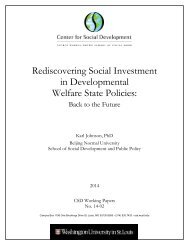Exploring and Assessing Intercultural Competence - Center for ...
Exploring and Assessing Intercultural Competence - Center for ...
Exploring and Assessing Intercultural Competence - Center for ...
You also want an ePaper? Increase the reach of your titles
YUMPU automatically turns print PDFs into web optimized ePapers that Google loves.
(things) changed as I got more experienced in the language<br />
it boosted confidence<br />
was the main medium <strong>for</strong> everything<br />
enabled me to take part in conversations<br />
helped in many ways, helped enjoy the experience (4)<br />
helped overcome ambiguity<br />
allowed integration/not excluded<br />
otherwise, closed to communication <strong>and</strong> culture<br />
am grateful<br />
able to talk to hosts <strong>and</strong> co-workers<br />
able to per<strong>for</strong>m job<br />
-hindered without language (1)<br />
felt like a child<br />
wouldn’t underst<strong>and</strong> most things<br />
my family did not speak English<br />
impossible to per<strong>for</strong>m without language<br />
otherwise tried English when possible (2)<br />
otherwise work would have failed<br />
relied on others to translate<br />
smiled, laughed, <strong>and</strong> used gestures<br />
otherwise would miss out on so much, frustrating, boring (2)<br />
would probably have been ripped off<br />
otherwise nuances get lost<br />
-<strong>and</strong> I studied more than required so I could speak<br />
willing to be corrected<br />
really wanted to learn<br />
made a real ef<strong>for</strong>t<br />
<strong>Exploring</strong> <strong>and</strong> <strong>Assessing</strong> <strong>Intercultural</strong> <strong>Competence</strong><br />
Their grasp of the relevance <strong>and</strong> importance of speaking the host language is eloquent, insightful<br />
<strong>and</strong> this from even those who were initially unsophisticated with <strong>for</strong>eign languages. Their<br />
thoughts derive not from linguistic study but from their own field experiences. They state not<br />
only why knowledge of the host language was important to success but they also speak to<br />
limitations imposed without it. And, finally, given this realization, they comment on why both the<br />
positive <strong>and</strong> negative aspects motivated them to work even harder to develop proficiency.<br />
The quest to correlate increasing levels of proficiency with potentially increased IC competencies<br />
remains an intriguing area of investigation, sorely overlooked by researchers in both language<br />
education <strong>and</strong> the intercultural field. More work needs to be done to establish this relationship<br />
<strong>and</strong> the effects one has on the other. Although at first glance, a correlation may seem intuitive, the<br />
connection between both needs to be made explicit (especially given that ironically so many<br />
prominent (American) interculturalists – in my own direct experience – are themselves<br />
appallingly monolingual; this, despite their years of prominence, research, publications, <strong>and</strong><br />
international travel. Also, what might be the implications of this clarification toward preparing<br />
future intercultural sojourners in terms of both program development <strong>and</strong> requirements? Can the<br />
intercultural sojourner transcend his/her native worldview without also having struggled with the<br />
process of entering another tongue? Or, is it adequate <strong>for</strong> interculturalists only to “know” other<br />
worldviews intellectually <strong>and</strong> vicariously, but not also experientially? The language-cultureworldview<br />
nexus raises many important yet fundamental questions.<br />
<strong>Center</strong> <strong>for</strong> Social Development<br />
Washington University in St. Louis<br />
37
















